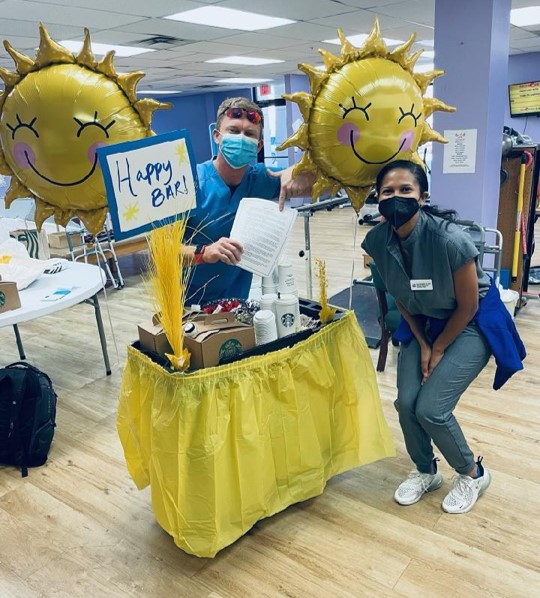By Jon Anderson, DPT, Senior Therapy Resource
We truly have heroes working in every department, making miracles happen each day despite tremendous odds. Here in Keystone our Therapy Resources decided that one way to give back is to spread joy with our Happy Bar!
Happy Bar Concept
As healthcare experts, we give a “prescription” for health and happiness along with sweet treats, coffee, tea, or any other goodies.
On the prescription, we can have 10 things:
- Take a few deep breaths. We all know that a deep breath helps us relax. No surprise, then, that decades of research have demonstrated that by taking slow, deep breaths, we calm the body and mind by activating the parasympathetic nervous system; when this happens, stress markers, heart rate, and blood pressure all decrease. That’s why taking deep breaths throughout the day can help keep us calmer and more balanced.
- Call an old friend. Research suggests that social connections’ impact on mortality is on par with blood pressure, cholesterol and obesity. The benefits likely come from the immediate activation of prosocial emotions and the long-term benefits of social support. This might be particularly helpful for my patients who are facing challenges with their physical health.
- Give someone a hug. Hugging releases oxytocin that helps build social bonds and lowers levels of the stress hormone cortisol. When hugging, we also release endorphins that lead to a sense of well-being and relaxation. But does anyone really need a scientist to tell us that hugs are good?
- Help a friend in need. Helping others allows us to meet some important psychological needs, such as developing our senses of agency and competence as we strengthen social relationships. When we act on our values by being a good friend and helping those in need, we foster a sense of purpose, which is foundational to a meaningful life. In fact, recent research suggests that those providing help may get more benefits than those receiving it.
- Write a thank-you note. Many studies over the last two decades have found that people who express gratitude are happier and less depressed. While one thank-you note is not the kind of gratitude practice that leads to lasting, positive cognitive change, I tell my patients that their notes should be the beginning of a habit of counting their blessings in writing.
- Sing in the shower … or anywhere. Making music, and in particular singing, just makes us feel better. And this happens through several mechanisms. We release endorphins when we sing; given this, it is not surprising that singing reduces pain. Stress hormone levels fall, leading to improved immune function. We make meaning as we embody the lyrics. I often add that people should join a choir, as singing surrounded by others greatly magnifies the benefits of singing.
- Dance to your favorite song. We all know that moving our bodies improves our health, but moving to music has additional benefits. The mood boost from dancing lasts much longer than from exercise alone. And dancing often has social benefits. There is even data suggesting dancing prevents cognitive impairment in the elderly.
- Go on an awe walk in a beautiful place. Awe is the feeling we get in the presence of something vast or beautiful that challenges our understanding of the world. It is something we depend on to keep life fresh. Awe makes us feel more alive, but, importantly, it also makes us more humble, more generous, and less self-centered. The purpose of an awe walk is to move more slowly and look carefully at the surroundings for wonder and beauty.
- Forgive someone. First off, forgiving someone doesn’t mean denying we were wronged; it means we let go of our anger and other unhealthy cognitive processes. Forgiveness requires some hard work, but the benefits are profound: Those who have learned to forgive live longer. This occurs from less stress, less depression, and better sleep and relationships.
- Talk to yourself in a kinder voice. We are often our own worst critic, and when our health goes bad, we can cast an unhealthy amount of blame upon ourselves. Self-compassion helps us heal ourselves rather than hurt ourselves. Talking to ourselves in a kinder voice is the key to this practice.

